Entering the Iranian Market? Start with the Right Legal Strategy.
If you’re planning to launch or expand a business involving foreign capital in Iran — whether through a new company, branch or joint venture — you’re stepping into a market full of opportunity; but also legal complexity. The Complete Legal Guide for Foreign Investors in Iran is designed to help you navigate these challenges effectively. From navigating foreign ownership rules and obtaining investment licenses to structuring tax-advantaged deals and complying with international sanctions, each step demands precision. That’s where LibraLaw, a leading legal advisory firm specializing in finance and investment law, comes in.
In the sections below, our team of seasoned legal professionals breaks down the critical issues you need to understand before committing capital in Iran. Backed by years of experience advising international clients, LibraLaw helps you reduce risk, unlock incentives and structure your investment for long-term success — legally and strategically. As you explore the intricacies of entering the Iranian market, consider how these factors play a pivotal role in international trade dynamics.
Are You Ready to Invest in Iran? Here’s Why Legal Advice is Key to Your Success.
Here are key areas where legal advice is essential:
- Choosing the right legal form: Will you benefit more from a limited liability company (LLC), a joint-stock company (JSC) or a branch office? Each option comes with different reporting obligations and levels of flexibility.
- Foreign ownership rules: Under the Foreign Investment Promotion and Protection Act FIPPA, 100% foreign ownership is permitted in most sectors; but legal support is necessary to interpret sector-specific limitations.
For more information on FIPPA’s foreign ownership provisions, see our article «Foreign Investment in Iran; How FIPPA Protects Your Capital».
- Obtaining investment licenses: Legal experts help prepare and submit the FIPPA application to the Organization for Investment, Economic and Technical Assistance of Iran (OIETAI), ensuring that your investment receives guarantees such as repatriation of profits and protection against expropriation.
- Drafting MOUs and joint venture contracts: Any ambiguity in these initial agreements may lead to costly disputes later. A lawyer ensures contractual clarity aligned with Iranian law.
- Understanding land acquisition and lease rights: Some areas restrict foreign ownership of land; so legal counsel is crucial in structuring leaseholds or local partnerships lawfully.
- Tax and customs planning: Early legal consultation can prevent major surprises, such as double taxation issues or noncompliance with import/export regulations.
- Navigating sanctions compliance: Especially relevant for multinational companies, legal professionals verify that the planned investment does not violate international restrictions.
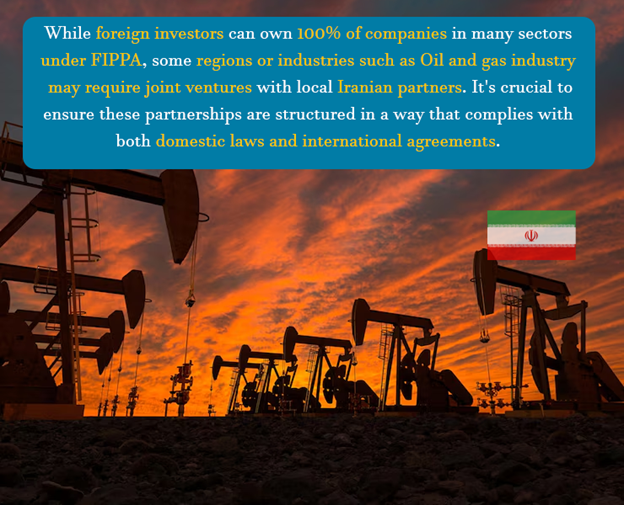
In short, having a local investment lawyer is not optional; it’s essential. With proper legal structuring and timely registration, you can not only protect your assets but also enhance your profitability in the Iranian market.
Need help with investment permits and government approvals in Iran? Libralaw is here to guide you.
At Libralaw, we offer comprehensive legal services related to obtaining and implementing government approvals for foreign investment projects in Iran. One of the key steps in this process is preparing and submitting the application for the Foreign Investment License, which must be filed with the Organization for Investment, Economic and Technical Assistance of Iran (OIETAI). While this step may seem procedural, it is legally sensitive and requires careful attention to various regulatory details.
Successfully managing an investment case in Iran depends on having deep, up-to-date knowledge of critical legal frameworks—particularly the Foreign Investment Promotion and Protection Act (FIPPA) and relevant bilateral investment treaties (BITs). At Libralaw, we specialize in navigating these complexities, drawing on our extensive experience advising high-profile international clients.
We provide legal services including, but not limited to:
- Drafting and submitting the FIPPA application with complete legal documentation to expedite approval;
- Structuring the investment to ensure eligibility for FIPPA benefits, such as profit repatriation, fair treatment and protection against expropriation;
- Representing investors before OIETAI and relevant government bodies;
- Providing risk assessments under international law, including analysis of how BITs affect your legal position;
- Advising on dispute resolution mechanisms, including access to international arbitration in the event of governmental interference or a breach of investment guarantees.
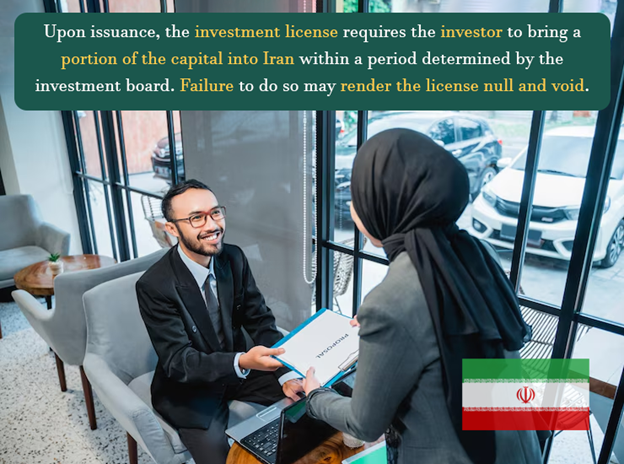
Libralaw’s team has advised on numerous successful investment projects and understands how to mitigate risks while maximizing protection under both Iranian and international investment law. If you’re a foreign investor seeking to establish a reliable and secure presence in Iran, Libralaw can help make the legal path clearer and smoother.
Why do legal feasibility studies and due diligence matter before you invest?
In any foreign investment project, conducting legal feasibility studies and comprehensive due diligence is crucial for making informed decisions and minimizing risks. At Libralaw, we offer specialized services in carrying out these evaluations, helping investors navigate the legal, regulatory and contractual landscape before making commitments; These studies are crucial for determining the most effective legal and operational framework for your investment.
Based on the findings, investors can choose from various contractual models, such as:
- Joint ventures, where both foreign and domestic entities share equity, control and risk;
- Buy-back contracts, often used in oil, gas and industrial projects, where returns are made through goods or output instead of cash;
- Build-Operate-Transfer (BOT) schemes, commonly applied to infrastructure projects like highways, power plants or utilities.
Each model carries different implications in terms of legal responsibility, ownership rights and exit strategies; This is why our team at Libralaw works closely with clients to recommend the most suitable structure, ensuring compliance with Iranian regulations and international investment standards.
With Libralaw’s expertise, your investment project will be built on a solid legal foundation, maximizing success while minimizing risk.

What are the tax incentives for foreign investors in Iran and how can they be utilized strategically?
One of the most compelling reasons foreign investors are drawn to Iran is the generous tax holiday schemes available under Iranian investment laws; These exemptions are designed not only to reduce the initial financial burden on investors but also to encourage long-term engagement, job creation and technology transfer across key economic sectors. Understanding and strategically leveraging these exemptions can be the key differentiator between a successful, profitable project and a stagnant one.
How Can You Benefit from Iran’s Corporate Tax Framework?
Iran applies a flat 25% corporate income tax rate on the net profits of legal entities. However, in practice, most investors do not pay this rate for many years due to structured exemptions; These exemptions are provided under the Direct Taxation Act, with implementing policies shaped by the Foreign Investment Promotion and Protection Act (FIPPA) and its bylaws.
While the flat 25% rate offers certainty in financial forecasting, its real benefit lies in the combination with exemptions that, in certain cases, can completely eliminate income tax obligations for up to 20 years or even longer.
How are tax exemptions determined in Iran?
Tax holidays and incentives are determined based on several parameters, including:
- Geographical location of the investment;
- Type of economic activity;
- Degree of local employment generated;
- Export volume and industrial linkages;
- Level of partnership with Iranian companies.
Let’s explore these dimensions in detail.
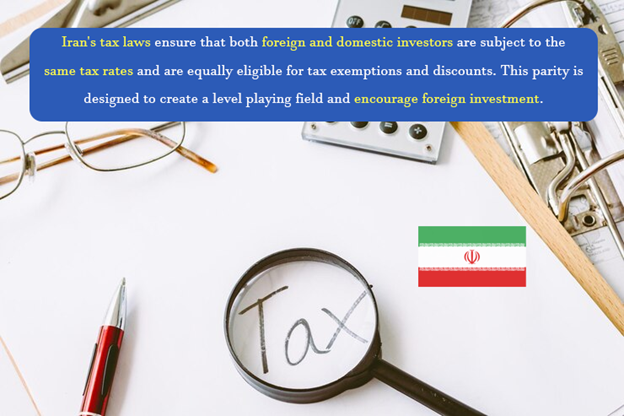
1. Location-Based Tax Holidays
Iranian investment law promotes the movement of capital to less-developed and strategically important regions by offering extended tax exemptions. These exemptions vary based on the location of the business, including:
| Exemption Duration | Region Type |
|---|---|
| 5 years | General zones (industry, mining, services incl. hospitals/hotels) |
| 7 years | Industrial Parks / Special Economic Zones |
| 10 years | Less-developed areas |
| 13 years | Less-developed areas in Industrial/Special zones |
| 20 years | Free Trade Zones |
For example, an Austrian medical equipment company investing in a private hospital within a Special Economic Zone in southeastern Iran (such as Chabahar) can benefit from 13 years of tax exemption, significantly enhancing the project’s internal rate of return.
2. Activity-Based Exemptions
Certain sectors are granted perpetual exemptions, particularly those that contribute to national sustainability or foreign exchange generation.
- 100% exemption: Income derived from agriculture, livestock, horticulture and fisheries.
- 100% exemption: Export of non-oil goods, services and agricultural products.
- 20% exemption: Export of raw and non-processed materials (e.g., minerals, wool).
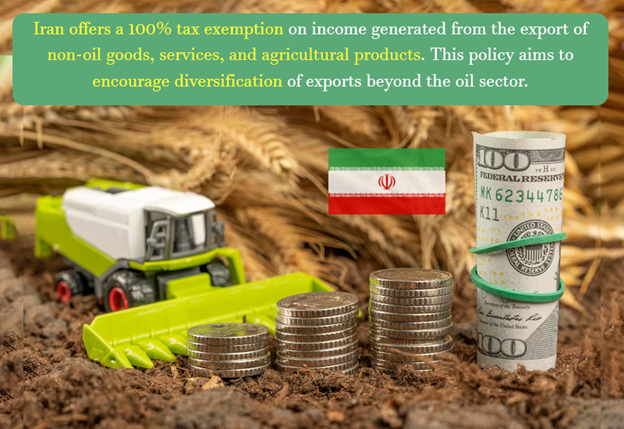
For example, a Swiss-based agricultural firm exporting pistachios and saffron from Iran would pay no income tax on its export profits indefinitely, under current laws.
3. Employment-Based Incentives
To promote local job creation, the Iranian tax code offers incremental exemptions to companies that increase their workforce:
- If a company increases its employment by at least 50% compared to the previous fiscal year, it will receive an additional 1-year exemption added to the baseline period.
For example, a Turkish textile factory established in an industrial park, originally eligible for 7 years of tax exemption, can extend this to 8 years by hiring 50% more local workers within a year.
4. Foreign Collaboration Incentives
Foreign brands that manufacture their products in cooperation with Iranian firms and export at least 20% of their production qualify for:
- A 50% tax rate reduction (the effective rate becomes 12.5% instead of 25%) after the expiration of the initial tax holiday period.
For example, a German kitchen appliance brand setting up production in Iran with an Iranian subcontractor and exporting 25% of its products can enjoy long-term tax relief, reducing effective tax costs in the post-exemption phase.

5. Free Trade Zones; Strategic Choice for Investors
Free Trade Zones (FTZs) offer unmatched incentives:
- 20 years of full tax exemption;
- No customs duties on imports used for manufacturing;
- Simplified registration and licensing procedures;
- Easier currency transfers and banking flexibility.
For example, a Chinese electronics assembler based in the Kish FTZ can import components duty-free, produce locally and pay zero income tax for two decades, making it an ideal base for regional export operations.
Strategic Tax Planning; How can Libra assist?
At Libralaw, we help you navigate these exemptions to reduce both your upfront and long-term tax liabilities, while also structuring your investment to qualify for as many benefits as possible. Our tax and investment lawyers offer:
- Legal feasibility assessments and zone comparison reports;
- Registration of tax-exempt status with the Iranian Tax Administration;
- Structuring export-oriented activities to maintain perpetual tax-free status;
- Optimization of employment growth models for exemption extensions;
- Drafting of co-production contracts to qualify for the 50% post-exemption rate.
Additionally, we assist foreign investors in understanding Islamic finance and taxation rules, ensuring their activities remain Sharia-compliant while optimizing their tax footprint.
To learn more about how taxation applies specifically to foreign investors in Iran, see our article «A Practical Guide to Iranian Tax Laws for Foreign Investors».

What legal services do foreign investors really need in Iran?
Navigating Iran’s finance and investment landscape requires not only an understanding of the law but also in-depth knowledge of administrative procedures and market dynamics. At Libralaw, our finance and investment lawyers offer comprehensive legal support to both foreign individuals and corporate investors, ensuring that your capital is protected and your projects comply with both local and international standards.
We Assist Clients in the Following Strategic Areas:
- Conducting due diligence and legal feasibility studies to identify risks and assess compliance with both Iranian and international laws;
- Evaluating market risks and regulatory barriers prior to committing capital;
- Managing FIPPA licensing and operational permit processes through the Organization for Investment, Economic and Technical Assistance of Iran (OIETAI);
- Drafting and negotiating investment contracts, including joint ventures, buy-back agreements and BOT structures;
- Representing clients before the Foreign Investment Advisory Council (FIAC), under the supervision of relevant ministries;
- Providing legal advisory services in direct investment, portfolio investment and project and corporate finance;
- Offering Islamic finance advisory, including Sharia-compliant fund structuring and taxation frameworks;
- Restructuring foreign investments, mergers and acquisitions (M&A) and strategic partnerships;
- Advising on equity and debt financing, as well as asset sale strategies;
- Resolving investment disputes, including international arbitration and the enforcement of foreign judgments.
These structures are explored in more detail in our article «A Simple Guide to Entering the Iranian Market; Choosing the Right Legal Structure for Foreign Investment», which outlines the pros, cons, and legal requirements for each option.
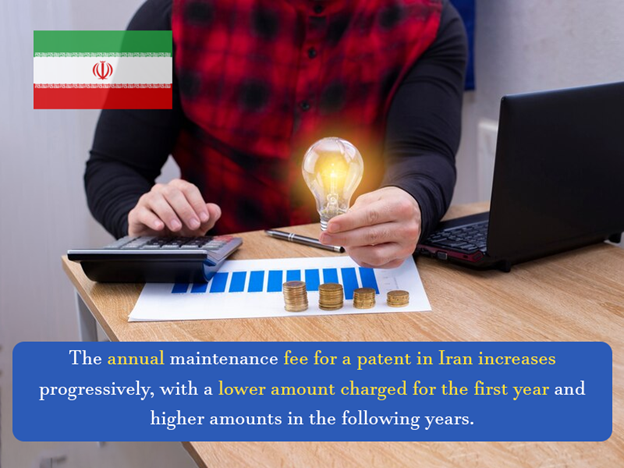
In addition to the above, foreign investors should take into account key legal considerations, such as the repatriation of profits and capital, which is only permitted under specific conditions outlined in FIPPA. Our legal team assists with planning a secure and legally sound investment exit strategy. We also provide guidance on tax incentives available to investors in free trade zones and priority sectors. Ownership of immovable property by foreigners is legally restricted in Iran; however, alternatives such as long-term leasing arrangements or corporate partnerships can be structured to address this limitation.
Having an experienced local lawyer is essential — particularly for managing licensing procedures, negotiating contracts, and ensuring regulatory compliance in sensitive sectors. By working with Libralaw, foreign investors gain a trusted legal partner who understands not only Iran’s legal framework but also the practical realities of doing business in the country.
Given the legal complexity of foreign investment in Iran — from licensing and tax exemptions to property ownership and regulatory compliance — consulting with specialized legal professionals is not just advisable, but essential. If you need guidance or assistance in this area, the expert legal team at Libralaw is here to help. With deep expertise and hands-on experience in Iranian investment law, we are ready to support you every step of the way.
Contact us today to ensure your investment is secure, compliant, and strategically structured.









